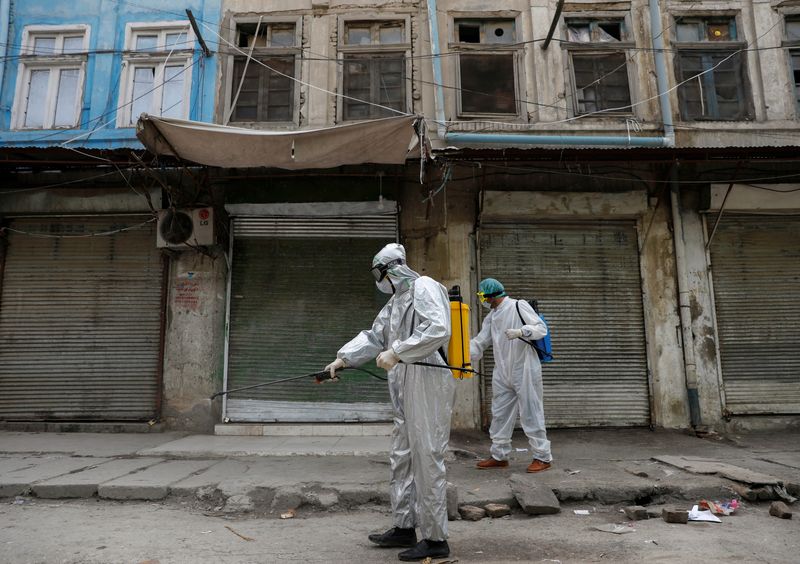
FILE PHOTO: Volunteers spray disinfectants on a street amid concerns about coronavirus disease (COVID-19) in Kabul, Afghanistan March 29, 2020. REUTERS/Mohammad Ismail
April 1, 2020
By Abdul Qadir Sediqi
KABUL (Reuters) – Afghanistan has been hit by a spike in prices of essential goods including food and medicines, as shortages and panic buying increase in the face of a rising coronavirus threat, residents and retailers said.
Coronavirus cases have shot up in Afghanistan in the last few days, approaching 200, but with limited ability to test, health officials fear the situation is more serious than it seems and could worsen in coming days.
Mustafa, a Kabul shopkeeper, said higher prices at wholesale markets had forced him to put up retail prices for items such as onions and potatoes, which had nearly doubled.
“If this continues, not only will prices triple but it will be impossible to find these items in the market,” he said.
The government ordered a lockdown in Kabul over the weekend, adding to the unease of residents.
“Whenever my family gets an opportunity to go out in the lockdown we grab food in fear we may not be able to find things tomorrow,” Kabul resident Ahmad Farhad, 25, told Reuters.
The coronavirus fears have pushed up demand in all major cities, a member of Afghanistan’s chamber of industries and mines, Abul Basir Reshtia, said.
Afghanistan has 220 flour factories with a capacity of about 225 tonnes a day, he said, adding production had doubled to control prices but reserves were running out.
Landlocked Afghanistan’s main supply line is through Pakistan, which in mid-March shut its borders as part of measures to contain its own coronavirus epidemic.
The deputy chief of Afghanistan’s Chamber of Commerce and Industries, Khan Jan Alkozay, told Reuters thousands of trucks loaded with goods including food and medicine, were stuck in Pakistan – not only at the border but at the ports, too.
Last month, Pakistani Prime Minister Imran Khan said the border crossing between the Pakistani town of Chaman and Afghanistan’s Spin Boldak, one of two main crossings between the countries, would be opened to allow essentials into Afghanistan.
However, the border closed after opening for two days on March 21, a senior Pakistani customs officer told Reuters by telephone from Chaman, adding that at least 2,000 containers full of Afghanistan-bound goods were parked on the Pakistan side.
The official said truck drivers were reluctant to travel to Afghanistan fearing prolonged quarantine.
Afghan traders met President Ashraf Ghani on Tuesday in a bid to get trade flowing, Alkozay said, adding that Ghani told the traders to get in touch with Pakistani officials to find a solution.
“The longer these items are stuck in Pakistan, the more people will feel the shortage in Afghan markets,” Alkozay said.
(Additional reporting by Gul Yousafzai in Quetta; Writing by Gibran Peshimam; Editing by Robert Birsel)

